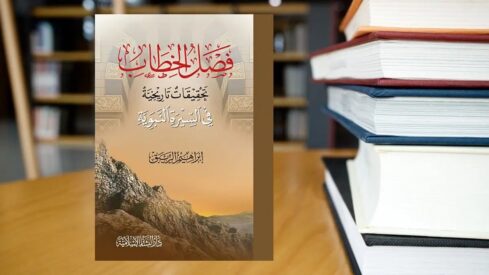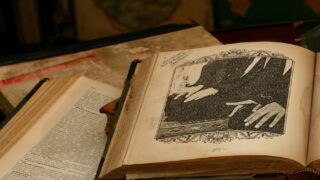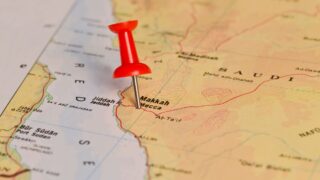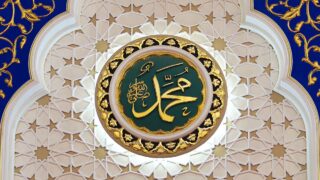Introduction
It was firmly established in the depths of the soul that the Syrian scholar Ibrahim Omar Al-Zaybaq is a valiant knight in the arena of Ayyubid studies, both in verification and authorship. This was confirmed by his abundant and rich output in this vast field, where none could rival him, and he held the reins of its events. Then, in the dawn of 2023, this entrenched concept changed—indeed, it was utterly overturned—after he published the book “Fasl Al-Khitab” (The Decisive Speech), whose title is derived from the words of the Almighty in the story of His repentant prophet David:
“And We strengthened his kingdom and gave him wisdom and decisive speech.”
(Surah Sad, 38:20)
Commentators have varied interpretations of its meaning, but perhaps the agreed-upon one, which aligns with what this book contains within its folds, is testimony and oaths, or the knowledge of judgment. Here, Al-Zaybaq, the scholar, is a judge who adjudicates in matters of dispute, as he has been granted understanding and decisiveness by the grace of Allah Almighty.
Before delving into the gardens of this unique work, which contains delicate musk and precious pearls, there is a necessary pause with the dedication. The dedications of the scholar Ibrahim Al-Zaybaq have audible breaths, all distinguished by a touch of loyalty: sometimes he dedicates to his father, sometimes to his wife, sometimes to one of his great friends like Ramzi Dimashqiyah and Muhammad bin Nasir Al-Ajmi, sometimes to his captivating beloved Damascus, and sometimes—as is the case here—to one of his esteemed teachers. He dedicates his book “Fasl Al-Khitab” to the genius of the Arabic language in Syria, the master and scrutinizer, the scholar Ahmad Ratib Al-Nafakh, may Allah have mercy on him, saying:
“To the one whose heart was imbued with the love of Arabic… who lived his life for it… bestowing its treasures upon his students… defending against its enemies.”
His book was published by Al-Bashaer Al-Islamiyyah Publishing House in Beirut in the most splendid attire, adorned with the garment of beauty. It consists of fifteen articles or reflections on events from the Prophet’s biography, all of which are pauses worthy of leisurely reading.
9 Reflections on “Fasl Al-Khitab”
Due to the brevity of space, I will suffice with a swift overview of nine of them, according to their arrangement in the book:
Was the Messenger of Allah ﷺ Born in the Year of the Elephant?
He confirms that the more appropriate historical timing for the Prophet’s birth is in the sixth century AD, without specifying the event of the Elephant as a year that coincides with his birth. He refutes the conclusion reached by the Tunisian researcher Hichem Djaït (d. 2021) that Abraha’s campaign on the Arabs occurred in 547 AD, based on inscriptions, and that it was not directed towards Mecca.
Al-Zaybaq—the historian and hadith scholar—mentions that Abraha’s campaign against Mecca is a historical event without doubt. He says:
“I do not know how that made sense to him, relying primarily on the Quran in his research, as he stated in his book ‘The Historicity of the Muhammadan Call in Mecca’.”
He continues:
“This researcher is imbued with Orientalist ideas about Islam; indeed, in some aspects, he defends them more than they do. He bases his dating of the biography on a positivist historical viewpoint, not on a faith-based one.”
The Story of His Wet-Nursing in Banu Sa’d
He denies the fabricated reports in the news of his wet-nursing about the drought of the desert and the nurses refusing him due to his orphanhood, until Halimah bint Abi Dhu’ayb Al-Sa’diyyah favored him by taking him reluctantly. The nursing of the Prophet was based on what the Arabs believed at the time—that nursing a child in the desert was a reason for his brilliance. He also refutes what Halimah saw of his blessings, stating that it is a report devoid of authenticity, with no chain of narration to establish it.
The Incident of His Chest Being Cleansed in His Childhood
He mentions that the incident occurred twice in his life: once in his childhood when he was about five years old, and a second time during his Night Journey (Isra’). Here, he responds to those who try to cast doubt on the authenticity of this report, such as the Egyptian writer Muhammad Husayn Haykal (d. 1956) in his book “The Life of Muhammad”. The report has reached us without any irregularity or defect, from four narrations. The relied-upon narration for its authenticity is what was produced by Imam Ahmad in his “Musnad” and Imam Muslim in his “Sahih” from Anas bin Malik, may Allah be pleased with him.
The Story of His Meeting Two Monks in Busra, Syria, in His Childhood and Youth
You find a critical study where he tried, as much as possible—and with the integrity of a historian—to free himself from a preconceived stance that might tempt him to accept this story or push him to reject it. He mentions that nothing is more harmful to scientific research than familiarity with reports and ideas. This led him, in pursuit of its truth, to follow the methodology of the hadith scholars: encompassing its narrations, attributing them to their sources, clarifying the condition of their narrators regarding justice and precision, examining their chains for continuity and interruption, scrutinizing their texts for any denials or anomalies, and then judging them appropriately in terms of authenticity or weakness.
He mentions that what has become widespread of this story in the books of the Prophet’s biography, ancient or modern, is the invalid report that does not withstand scientific criticism. The more accurate report has been omitted from the biographies. The Prophet ﷺ did not receive any indication before his mission that he would be the Messenger of this nation, as stated in the Almighty’s saying:
“And you did not expect that the Book would be conveyed to you except [as] a mercy from your Lord.”
(Surah Al-Qasas, 28:86)
Professor Al-Zaybaq clarifies that European writers seized upon this story, weaving many legends around it. He disagreed with Sheikh Al-Albani, his teacher Shu’ayb Al-Arna’ut, and Sheikh Abdul Qadir Al-Arna’ut, who authenticated this story, relying on the apparent chain of narration without analyzing its text. It is known that the authenticity of the chain does not necessitate the authenticity of the text, and judging a hadith is an exercise that may bear differences.
Moreover, Sheikh Al-Albani said in his book “Nasb Al-Majaniq”:
“May Allah have mercy on the one who said: The truth is not known by men; know the truth, and you will know the men.”
The text of the story has varied from one narrator to another, indicating its disturbance and the weakness of its narrators.
If the Prophet ﷺ, as a boy with his uncle Abu Talib on his trade journey to Syria, had met the monk Bahira, this event—had it occurred—would have left an impact on Meccan society and would have paved the way for them to believe the Prophet ﷺ when he proclaimed his call. The Prophet ﷺ would have used it as an argument against Quraysh, especially his uncle Abu Talib, and he would not have forgotten or ignored it. It is surprising that it was omitted from the events of the biography and was not mentioned by the Prophet ﷺ throughout his life, which is something that the logic of the event would have necessitated if it had truly occurred.
His Marriage to Khadijah bint Khuwaylid
He confirms that the report of the Prophet’s marriage to Khadijah (may Allah be pleased with her) without her father’s consent and her intoxicating him is not to be considered due to its denouncement.
Orientalists relied on this weak and invalid report to undermine his status among his people. Al-Zaybaq sees that what was mentioned about her father marrying her off while he was drunk has not been established with a valid chain of narration, and its text is denounced. These narrations, despite their weakness, are inconsistent with the logic of custom in that era. They do not align with the status that Banu Hashim and the Messenger of Allah ﷺ held among Quraysh at the time, nor with their noble lineage, especially since the Prophet ﷺ and Khadijah trace back in lineage to their grandfather Qusayy bin Kilab, and the sons of Qusayy are equal in honor. He then suggests that her uncle, Amr bin Asad, was the one who married her to the Messenger of Allah ﷺ.
Did the Messenger of Allah ﷺ Sacrifice to Idols Before His Mission?
Al-Zaybaq clarifies that some contemporary researchers raise this issue, aiming behind it—though there’s more than meets the eye—that the Prophet ﷺ before his mission was upon the religion of his people in his childhood and youth. The narration is based on the Prophet’s meeting with Zayd bin Amr bin Nufayl at the bottom of the valley of Baldah on the way to Al-Tan’eem. The Prophet ﷺ presented him with a dish containing meat, but Zayd refused to eat from it, then said:
“I do not eat what you slaughter on your altars, and I only eat what Allah’s name has been mentioned over.”
Some modern scholars have cited this report to challenge the infallibility of the Prophet ﷺ before the mission. In unbiased scientific research, there is no reason to engage with what is not authentic from reports and statements. In “Musnad Ahmad”, the Prophet ﷺ used to say to Khadijah before the mission:
“O Khadijah, by Allah, I will never worship Al-Lat ever; by Allah, I will never worship Al-Uzza ever.”
The scholars of Islam unanimously agree that the prophets are infallible from associating partners with Allah before prophethood. The Prophet’s ﷺ status in this regard is like that of other prophets; they are, in a state of absence of revelation before it comes to them, not participating with the people of misguidance among their people. The Prophet ﷺ—despite his hatred for idols—did not openly denounce them among Quraysh, nor did he publicly express his contempt for them. He did not show any disagreement with his people, despite the distress he felt in his heart about what they were upon.
Al-Zaybaq sees that this is one of the signs of his prophethood; for if he had openly denounced their idols at that time, then criticized them after his prophethood, people would have said that when he failed to achieve what he wanted, he claimed prophethood to achieve his aims, and none would have believed him then. He then says:
“What this issue has stirred of doubt is nothing more than mere clamor that does not stand on sound understanding free from whim, nor is it based on an authentic or acceptable hadith. Its sole aim is to slander the Messenger of Allah ﷺ and his infallibility from associating partners with Allah before his mission, out of aggression against him and hatred for his call.”
Did the Prophet ﷺ Attempt Suicide When Revelation Ceased?
He mentions that most biographers of the Prophet’s life, both ancient and modern, assert that when revelation ceased, the Prophet ﷺ intended to throw himself from a high mountain. The report became so widespread that it became an accepted fact among the vast majority of them, without scrutinizing it or subjecting it to the necessary criticism and authentication, especially since it contains an explicit slander that contradicts the infallibility required by his prophethood.
The authentic narrations relied upon in the early stages of the Prophet’s mission did not mention that when revelation ceased, he grieved to the point that he went repeatedly to throw himself from the peaks of high mountains. Al-Zaybaq confirms that the report is from the disconnected narrations (balaghat) of Ibn Shihab Al-Zuhri (d. 124 AH / 741 CE), and it is known among the scholars of hadith that the disconnected narrations of Al-Zuhri are weak and insignificant; they even said due to their extreme weakness: they are like the wind. In summary, the report of the Prophet’s intention to throw himself from a high place is not authentic in any way, given its disturbance and the weakness of its narrators.
Are the Ahabeesh of Quraysh Pure Arabs or Slave Servants?
Some contemporary writers were confused about the origin of the Ahabeesh of Quraysh, and they went in various directions in defining them, taking some of the Orientalists’ statements as their sources, like the Iraqi historian Jawad Ali (d. 1987). Al-Zaybaq clarifies—with sound understanding of the reports, supported by evidence and proof—that they are pure Arabs.
The Story of the “Gharaniq”
He elaborates on the description of the idols of Quraysh—Al-Lat, Al-Uzza, and Manat—explaining that the ‘Gharaniq’ are originally the males of water birds. They claimed that the idols bring them closer to Allah and intercede for them with Him, so they were likened to birds that rise and ascend in the sky.
He then mentions that it is a story evidently false, cited by Orientalists within the folds of the Prophet’s biography to challenge the reality of revelation and deny his ﷺ infallibility, claiming that he fabricated the Quran from himself. Despite its weakness and invalidity, many of them clung to it, led by the German Theodor Nöldeke (d. 1930) and the British Montgomery Watt (d. 2006). Western interest in it was renewed on a popular level in 1988 following the publication of Salman Rushdie’s novel “The Satanic Verses”, using it as a means to attack the Holy Quran, our Prophet ﷺ, and his noble companions. In response to the anger of Muslims worldwide over the distortions of facts it contained, many Europeans endorsed it.
The story of the ‘Gharaniq’ was defended by Orientalists, which is not surprising, as they deviated from the scientific method in research because it met a desire in their souls. They are keen, with utmost zeal, to slander the Prophet’s prophethood ﷺ by any means! The real surprise is from those among our own people who tried to affirm its occurrence, adhering to the apparent chains of its narrations without knowledge or disregard of the hadith science in critiquing the text.
Al-Zaybaq then explains that the reason for inventing this story was to find an explanation for the authentic occurrence of Muslims and polytheists in Mecca prostrating together when the Prophet ﷺ recited to them the noble “Surah An-Najm”. It was the first surah that the Messenger of Allah ﷺ publicly recited in Mecca. When the Prophet ﷺ finished its recitation, he prostrated, and the Muslims and polytheists prostrated with him equally. No one remained except Umayyah bin Khalaf, who took a handful of dirt, lifted it to his forehead, prostrated on it, and said: “This is sufficient for me.”
The summary of the ‘Gharaniq’ story is that when the Prophet ﷺ saw his people turning away from him, he wished in himself that something would come to him from Allah that would bring him and his people closer. So one day, he sat in one of their gatherings around the Kaaba and recited to them:
“By the star when it descends…”
(Surah An-Najm, 53:1)
Until he reached:
“Have you considered Al-Lat and Al-Uzza, and Manat, the third—the other one?”
(Surah An-Najm, 53:19-20)
The devil cast two phrases upon his tongue—from what Quraysh used to say during their circumambulation of the Kaaba:
“Those are the exalted cranes (gharaniq al-ula), and their intercession is hoped for.”
When Quraysh heard that, they rejoiced and prostrated with the Muslims. Al-Zaybaq clarifies that this is a false narration that is not authentic in any way. It was reported with disconnected chains or chains filled with weak narrators, denied by knowledgeable scholars. However, Ibn Hajar—who was dominated here by the hadith technique in narration, and absent in understanding—strained to find reasons to affirm its occurrence, which is one of his slips. A story of such gravity, impacting creed, cannot be authenticated with disconnected and weak chains, even if they are numerous and varied in their sources, and if all the conditions for authenticating disconnected narrations are not met. Many Muslim scholars, ancient and modern, have rejected this story, like Fakhr Al-Din Al-Razi, Ibn Al-Arabi, and Qadi Iyad. Among those who critiqued it in terms of chain and text is Sheikh Al-Albani in his book titled “Nasb Al-Majaniq Li-Nasf Qissat Al-Gharaniq” (Erecting Catapults to Demolish the Story of the ‘Gharaniq’).
By Alaa Masri Al-Nahr


















